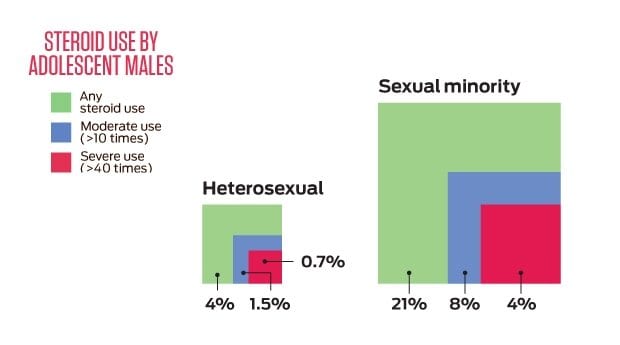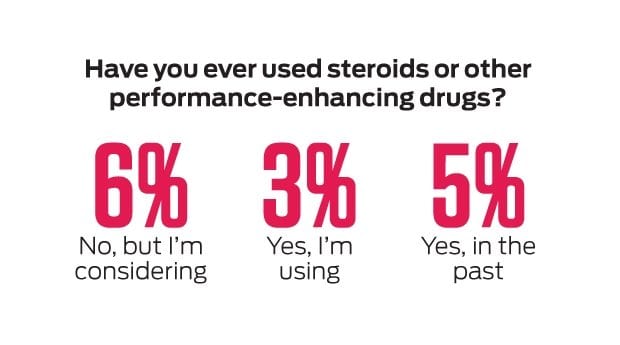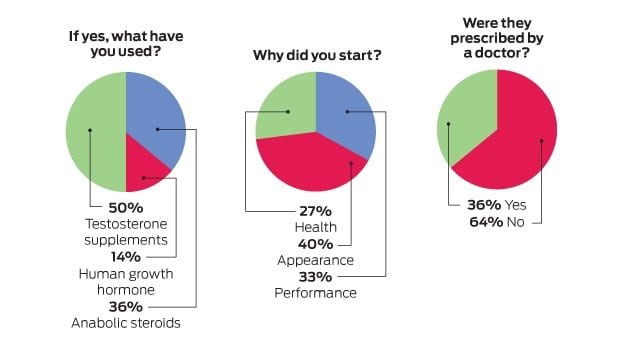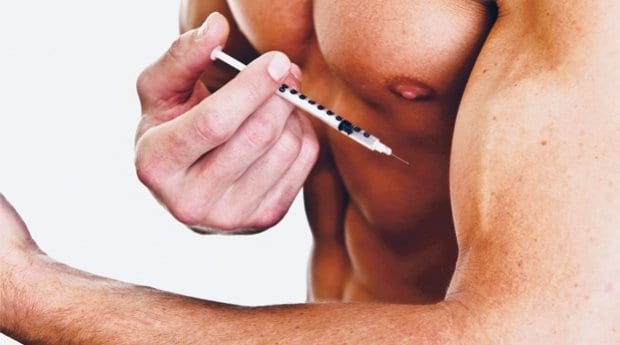
Dr Aaron Blashill studied sexual orientation and steroid use in American teenage boys. Credit: Xtra staff

Via squirt.org, Xtra asked men who have sex with men if they use steroids. Credit: Xtra staff

Via squirt.org, Xtra asked men who have sex with men if they use steroids and, if so, why and what they use. Credit: Xtra staff
Tom, a government employee from Alberta, was 38, overweight, depressed and disliked his body. He had always lived a healthy life; making one exception for steroids wouldn’t hurt, he thought.
At five feet 10 inches and 160 pounds, Tom (who asked Xtra not to reveal his last name) had always felt small. On steroids, he swelled to a fit, muscular 220 pounds. Better yet, testosterone was a rush. He felt young and energetic. His libido surged. At his peak, he took a gram of testosterone a week, as much as many professional bodybuilders.
“It’s like putting a teenage person inside your body,” he says.
But being a teenager has downsides. He became angry and unpredictable and had risky sex that damaged his long-term relationship. Now, seven years later, Tom says he is fighting to rid himself of steroids.
“I’m tired of it. It’s affected my health, and it’s been a constant struggle to purge myself,” he says.
If gay teens are using steroids more often than straight teens, then stories like Tom’s could be a warning. But despite doctors’ and anti-drug campaigns’ warnings about ’roid rage and shrunken testicles, the study of artificial testosterone is still in its infancy.
Dr Harrison Pope, Jr, a psychiatrist at Harvard Medical School and a prolific researcher into substance abuse, likes to use a metaphor. Imagine tobacco did not exist in common use until 1981, and the oldest lifelong smokers were now in their 50s. What would we know about the long-term effects of tobacco? We might have a few case reports on lung cancer and emphysema, especially among heavy users, but we would have no idea the magnitude of what was about to hit us. That is exactly, Pope says, where we stand with anabolic steroids.
Not that steroids are necessarily always dangerous. Pope is the first to admit we simply do not know what the long-term effects will be. Anyone who says that steroids are safe is just as premature as anyone who says they are terribly dangerous. It’s just too soon to tell.
What Pope does see, however, is the leading edge of what he calls an “epidemiological bubble.” As steroid users grow older, the rates of health complications from long-term use are slowly rising. As the oldest lifelong steroid users enter their 60s and 70s in the coming decades, that bubble could spell trouble.
The best known side effect of prolonged steroid use is heart disease. Pope studied weight lifters who use steroids and found they suffer more than non-users from impaired heart function and buildup of plaque in the arteries, both of which can lead to heart attacks.
Heart disease, however, is dependent on dose; heavy users like Tom who take huge quantities of testosterone are more likely to suffer the ill effects. Many gay men, Pope points out, are moderate users — they want to look more like Adonis and less like Hercules.
A greater risk for light steroid users is hypogonadism. Even moderate doses of steroids signal the brain to shut down fully the body’s natural production of testosterone. When some men, especially older men, stop taking steroids, their bodies fail to pick up the slack. The resulting deficit of testosterone leaves them exhausted, depressed and short on sex drive and erectile function.
The solution might be for young men to simply stop taking steroids as they enter middle age, were it not for a third discovery: steroids, it turns out, are addictive. Ruth Wood, a neurobiologist at the University of Southern California, discovered that hamsters — given the choice — will inject themselves with testosterone to the point of death. To her surprise, however, if she gave the hamsters drugs to block opioids, the addictive behaviour stopped. Somehow, testosterone feeds the reward systems of mammal brains — even without getting us perceptibly high.
While Pope and Wood worry about the consequences of recreational steroid use, other experts think the dangers have been overblown. Rick Collins, a New Jersey lawyer and authority on steroid law, says that for steroids, as with most drugs, the dose makes the poison.
Collins helped perform research at the University of South Florida that showed most modern steroid users are, in fact, adult, health-conscious, educated and aware of what they are doing.
“We tend to too often look at the worst abuser as the benchmark,” he says. “And there are some people who will abuse steroids and hurt themselves. But from the results of our study, there appear to be a proportion of steroid users who are using it with a mind towards harm reduction and responsibility.”
In the end, Pope agrees with Collins that, especially on the effects of moderate steroid use, the jury is still decidedly out.
“It’s important to emphasize that there’s still a fair amount of guessing here,” he says. “Scientists make no pretence that we know all the answers, by any chance.”


 Why you can trust Xtra
Why you can trust Xtra


